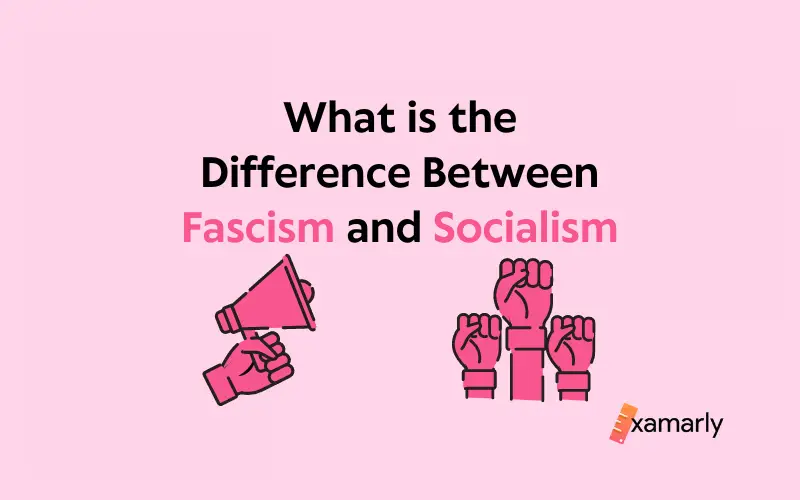Do you know what is the difference between fascism and socialism? Both political ideologies have been at the forefront of global discourse, but understanding their differences is crucial in navigating the current political climate.
From Mussolini’s Italy to the USSR, the theory of fascism and socialism have left their mark on history. Fascism and socialism are two of the most misunderstood political ideologies. This article aims to clarify the differences between these two ideologies and their impact on society.
Read on to gain a deeper understanding of these two ideologies.
- Difference Between Fascism and Socialism: What is Fascism?
- Origin of Fascism
- Principles of Fascism
- Type of Ideology
- Ownership of Production Means
- Class Conflict
- Belief in God
- Number of Political Parties
- Difference Between Fascism and Socialism: What is Socialism?
- Origin of Socialism
- Principles of Socialism
- Type of Ideology
- Ownership of Production Means
- Class Conflict
- Belief in God
- Number of Political Parties
- Difference Between Fascism and Socialism
- Conclusion
- FAQs on Difference Between Fascism and Socialism
Difference Between Fascism and Socialism: What is Fascism?
Fascism is a political ideology that emphasizes nationalism, authoritarianism, and a strong centralized government. It typically prioritizes the needs of the state over the needs of the individual and seeks to maintain order and control over society. Fascism often involves suppression of dissent and a cult of personality surrounding the leader.
The economy is usually seen as being subordinate to the needs of the state, with private enterprise existing in support of the state’s goals.
Fascist ideology is considered a far-right ideology and has been associated with totalitarian regimes in the past, such as Nazi Germany under Adolf Hitler and Fascist Italy under Benito Mussolini.
Fascism emphasizes the importance of the nation and national unity, often promoting a strong sense of national pride and solidarity. This nationalism is often accompanied by a belief in the superiority of the nation and its people, as well as a mistrust of other nations and groups.
Individual freedoms and rights are often suppressed in order to maintain order and ensure the stability of the state. Dissent is not tolerated, and opposition is often met with violence or repression.
In terms of the economy, fascism typically involves a mixture of private enterprise and state control. Private enterprise is allowed, but it is subordinated to the needs of the state and subject to government regulation and control. The state is often seen as being responsible for directing the economy and ensuring its stability.
While the specifics of each fascist movement have varied, they all share a belief in the importance of the nation and the superiority of their own people, as well as a willingness to use violence and repression to maintain order and control.
Origin of Fascism
The origin of fascism can be traced back to the early 20th century, particularly the aftermath of World War I. The war resulted in widespread social, economic, and political upheaval, including economic instability, mass unemployment, and political unrest. In response to these conditions, various political movements emerged, including fascism.
Fascism as a distinct theory originated in Italy under the leadership of Benito Mussolini. In 1919, Mussolini founded the National Fascist Party and began promoting his ideas of nationalism, authoritarianism, and the importance of the state. He came to power in 1922 and established a fascist regime in Italy, which he ruled as a dictator until 1943.
Mussolini’s ideas and the success of his regime in Italy had a significant impact on other countries, particularly Germany, where the fascist movement found support among conservative and nationalistic elements of the population. In 1933, Adolf Hitler and the Nazi Party came to power in Germany, establishing a fascist regime that lasted until the end of World War II in 1945.
Fascist ideology as a political ideology has since spread to other countries, but it has never been as influential or widespread as it was in Italy and Germany during the interwar period. Despite its legacy of violence and repression, fascism continues to attract support from far-right elements in some countries and remains a controversial and divisive issue in contemporary politics.
You Might Also Like To Read: Difference Between War And Battle.
Principles of Fascism
The principles of fascism can be summarized as follows:
- Nationalism: Fascism emphasizes the importance of the nation and national unity, often promoting a strong sense of national pride and solidarity.
- Authoritarianism: Fascism is characterized by a strong centralized government that exercises total control over the country and its citizens. Individual freedoms and rights are often suppressed in order to maintain order and ensure the stability of the state.
- Totalitarianism: Fascism seeks to control all aspects of society, including the economy, the media, and cultural institutions. Dissent is not tolerated, and opposition is often met with violence or repression.
- Militarism: Fascism often glorifies war and military power, viewing military strength as a key aspect of national pride and superiority.
- Superiority: Fascism often involves a belief in the superiority of the nation and its people, as well as a mistrust of other nations and groups.
- Leader cult: Fascism often involves a cult of personality surrounding the leader, who is seen as the ultimate authority and representative of the nation.
- Hierarchy: Fascism emphasizes strict social and economic hierarchies, with the state and the leader at the top and the masses at the bottom.
- Corporatism: Fascism often involves a mixture of private enterprise and state control, with the state directing the economy and private enterprise existing in support of the state’s goals.
- Anti-communism: Fascism often views communism as a threat to the nation and seeks to suppress it.
- Anti-liberalism: Fascism is typically seen as being in opposition to liberal democracy and the principles of individual freedom and equal rights
Type of Ideology
Fascism is often seen as being at odds with other political ideologies, particularly socialism and communism, which place a greater emphasis on economic equality and individual freedoms. However, fascism has also been influenced by various other ideologies, including syndicalism, a form of socialism that emphasizes the importance of workers’ unions and direct action. There is a very low inclination towards democracy.
Ownership of Production Means
In fascist regimes, the factors of production are often a mixture of private enterprise and state control. While private enterprise exists, it is often subject to state direction and control, and its ultimate goal is to support the goals of the state.
Under fascism, the state plays a central role in directing the economy and determining the allocation of resources. The state often exercises control over the economic policies of key industries, such as transportation, communication, and heavy manufacturing, and may also regulate prices and wages to maintain stability.
At the same time, fascist regimes often encourage private enterprise and support the growth of big business, viewing these entities as essential to the development and strength of the nation. However, private enterprise is often subject to state control and regulation, and is expected to serve the goals of the state rather than its own interests.
Class Conflict
Fascist regimes often view class conflict as a threat to the stability and unity of the nation. Rather than promoting economic equality, fascism emphasizes the importance of hierarchy and the maintenance of strict social and economic divisions.
Under fascism, the state and the leader are typically seen as being at the top of the social and economic hierarchy, while the masses are at the bottom. This hierarchical structure is meant to ensure stability and order, and to prevent the rise of dissent or revolution.
To minimize class conflict, fascist regimes often employ various tactics to suppress dissent and opposition, such as censorship, propaganda, and violence. Dissent is not tolerated, and those who challenge the authority of the state or the leader may be subjected to repression or violence.
Belief in God
The role of religion in fascism is a complex and often debated issue. While some fascist regimes have been hostile to organized religion, others have embraced it and sought to co-opt its power for their own purposes.
In some cases, fascist regimes have seen religion as a useful tool for controlling the masses and promoting social stability. They may use religious symbols and language to appeal to the masses and to justify their actions. For example, in Nazi Germany, the regime sought to promote a “positive Christianity” that was meant to support its ideology and its political goals.
However, in other cases, fascist regimes have been hostile to organized religion and have sought to suppress it. They may view religion as a rival source of authority and as a threat to the power of the state.
Number of Political Parties
In fascist regimes, there is typically only one political party that holds monopoly power. Political opposition and dissent are not tolerated, and alternative political parties and organizations are often suppressed or banned.
The single political party in a fascist regime is typically controlled by the leader and a small group of elites, and its goal is to maintain the power and authority of the state. The party is used as a tool for propaganda, mobilization, and control, and its members are expected to adhere to the ideology and goals of the state.
In a fascist regime, the state and the leader hold ultimate power and authority, and the political party serves as an instrument for maintaining and extending their control.
Difference Between Fascism and Socialism: What is Socialism?
Socialism is a political and economic ideology that advocates for the collective ownership and control of the means of production and distribution of goods and services. Socialists believe that society’s wealth and resources should be shared equally among its members, rather than being controlled by a small group of individuals or corporations.
The goal of socialism is to create a society in which all individuals have equal access to the resources and opportunities they need to meet their basic needs and to live fulfilling lives.
Socialism also emphasizes the importance of social welfare programs, such as healthcare, education, and housing, and views these programs as a basic right of all citizens. It aims to provide for the needs of the community as a whole, rather than just those of a wealthy few.
Origin of Socialism
The origins of socialism can be traced back to the late 18th and early 19th centuries, when intellectuals and philosophers in Europe began to critique the negative impacts of the Industrial Revolution and the rise of capitalism. These early socialists believed that the wealth and resources of society should be shared equally among its members, rather than being controlled by a small group of individuals or corporations.
Socialist ideas gained traction during the late 19th and early 20th centuries, as workers’ movements and political parties emerged to advocate for socialist reforms. In the years following World War I, socialist and communist parties came to power in several countries, including the Soviet Union, China, and Cuba.
Related Article: Capitalism vs. Socialism vs. Communism.
Principles of Socialism
The principles of socialism can be summarized as follows:
- Collective Ownership: Socialists believe that the means of production, such as factories, land, and resources, should be owned and controlled collectively by the community or the state, rather than by individuals or corporations.
- Equality: Socialists believe in equality of opportunity and outcome, and that wealth and resources should be shared equally among all members of society.
- Social Welfare: Socialists believe in the importance of social welfare programs, such as healthcare, education, and housing, and view these programs as a basic right of all citizens.
- Workers’ Rights: Socialists believe in the rights of workers to form unions, to bargain collectively, and to earn a living wage.
- Democracy: Socialists believe in democratic decision-making and control, and reject the idea of rule by a small group of elites.
- Abolition of Exploitation: Socialists believe in the abolition of exploitation, and reject the idea that some individuals or groups should profit at the expense of others.
- Community: Socialists emphasize the importance of community and social solidarity, and believe that society’s resources should be used to serve the needs of all members of society.
Also Read: Difference Between Socialism And Democracy.
Type of Ideology
Socialism is a political and economic ideology that falls under the larger umbrella of left-wing political thought. It is often contrasted with capitalism, which is a right-wing political ideology that emphasizes individual liberty and private ownership of the means of production.
Socialism can also be classified as a form of collectivism, as it advocates for public ownership and control of the means of production and distribution of goods and services. This is in contrast to individualism, which emphasizes the importance of individual rights and freedoms, and argues that the pursuit of individual interests will lead to the best outcome for society as a whole.
Ownership of Production Means
Under socialism, the means of production, such as factories, land, and resources, are owned and controlled collectively by the community or the state.
One of the earliest and most influential socialist thinkers was the French philosopher and writer, Henri de Saint-Simon, who proposed that the means of production should be owned and controlled collectively by society.
Related Article: Difference Between Capitalism and Socialism.
Class Conflict
Under socialism, the conflict between social classes is often viewed as a fundamental aspect of capitalist societies. Socialists argue that capitalism creates and perpetuates inequality by allowing a small group of individuals to control the means of production and accumulate wealth, while the vast majority of people are left to struggle to make ends meet.
In a socialist society, the state or the community is responsible for the means of production and distribution, and the goal is to abolish class conflict by creating a more equal distribution of wealth and resources.
Socialists believe that by eliminating the concentration of power and wealth in the hands of a few, society can create a more cooperative, democratic, and fair social order. That being said, class conflict can still exist in socialist societies, particularly in cases where the state or the community becomes bureaucratic, undemocratic, or controlled by a small group of elites.
To address this, many socialists advocate for democratic decision-making processes that allow the working class and other marginalized groups to have a voice in the political and economic systems.
You Might Also Like To Read: Difference Between Capitalism, Socialism And Mixed Economy.
Belief in God
Socialism as a political and economic ideology is neutral with regards to religious beliefs. It does not require a belief in God nor does it promote atheism. Socialists come from a variety of religious and non-religious backgrounds and there is no one religious belief that is considered central to the ideology.
Socialism focuses primarily on the reorganization of society’s political and economic structures, with the goal of achieving greater social equality, fairness, and social justice. While religious beliefs may inform a person’s values and motivations, they are not a necessary component of the socialist ideology.
Number of Political Parties
The number of political parties that identify as socialist varies depending on the country and its political system. In some countries, there may be only one dominant socialist party, while in others there may be several smaller parties that compete for political power.
In societies with democratic socialism, the number of political parties that identify as socialist is often influenced by the level of support for socialist ideas and principles among the general population. In countries with a strong tradition of socialism, multiple parties may compete for political power and representation of socialist ideas.
In countries with authoritarian or one-party systems, there may be only one socialist party that holds a monopoly on political power. In these cases, political opposition and the existence of multiple parties may be restricted or suppressed.
Difference Between Fascism and Socialism
| Category | Fascism | Socialism |
|---|---|---|
| Ideology | Authoritarian, Nationalistic, Extreme Right-Wing. | Democratic, Progressive, Left-Wing. |
| Means of Production | Private Ownership with State Control. | State or Collective Ownership. |
| Class Conflict | Emphasizes the superiority of the nation over the individual and encourages class collaboration. | Views class conflict as a central problem and aims to abolish it through greater equality and fairness. |
| Political Parties | One Dominant Party with Limited Political opposition. | Multiple Parties Allowed, with Competition for Political Power. |
| Role of State | Strong, Authoritarian State. | Strong, Interventionist State. |
| Economic System | Controlled Capitalism. | State Planning or Market Socialism. |
| Individual Freedom | Limited, with Emphasis on National Unity. | Greater, with Emphasis on Social Equality. |
| Labor Unions | Repressed. | Encouraged. |
| Distribution of Wealth | Unequal, with Emphasis on the Elite. | More Equal, with Emphasis on Redistribution. |
| Nationalism | Extreme, with Emphasis on National Unity and Supremacy. | Nationalism seen as Secondary to Internationalism and Solidarity. |
| Role of Military | Prominent, with Emphasis on Aggressive Expansion. | Used only for Defense and Peacekeeping. |
Conclusion
In summary, fascism prioritizes the power of the state, nationalism, and order, while socialism prioritizes equality and the collective good.
Related Articles:
FAQs on Difference Between Fascism and Socialism
What is the difference between fascism and socialism?
Fascism is a political ideology that emphasizes extreme nationalism, authoritarianism, and the suppression of political opposition. Socialism, on the other hand, is a political and economic ideology that advocates for collective ownership of the means of production and equal distribution of wealth and resources.
Is fascism left-wing or right-wing?
Fascism is often considered a right-wing ideology because of its emphasis on nationalism, authoritarianism, and the suppression of political opposition. However, it differs from traditional right-wing ideologies such as conservatism and classical liberalism in its embrace of totalitarianism and rejection of individual rights.
Can fascism and socialism coexist?
No, fascism and socialism are fundamentally incompatible ideologies. Fascism is based on extreme nationalism and authoritarianism, while socialism advocates for collective ownership of the means of production and equal distribution of wealth and resources.
Is fascism a form of socialism?
No, fascism is not a form of socialism. While both ideologies may share some similarities in their focus on centralization and control, they have fundamentally different views on issues such as ownership of the means of production, individual rights, and the role of the state.
What are the similarities between fascism and socialism?
Despite their differences, fascism and socialism share several similarities, including:
1) Centralized control: Both ideologies advocate for a highly centralized state with a strong leadership that exercises control over society and the economy.
2) State control of the economy: Both fascism and socialism advocate for state control over the economy, with fascism promoting state control over industry and production, and socialism advocating for collective ownership of the means of production and equal distribution of wealth and resources.
3) Focus on equality: Both ideologies prioritize the idea of equality, with fascism emphasizing equality within the nation, and socialism emphasizing equality for all members of society.
4) Rejection of capitalism: Both fascism and socialism reject the principles of capitalism, viewing it as a system that benefits a small ruling class at the expense of the working class.






